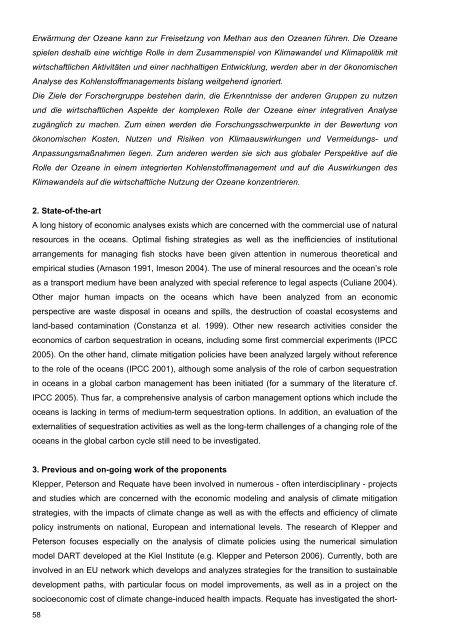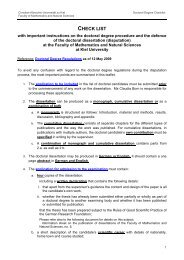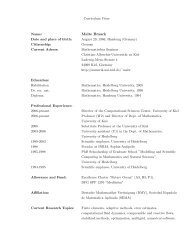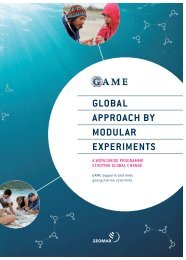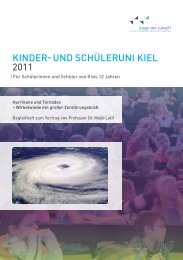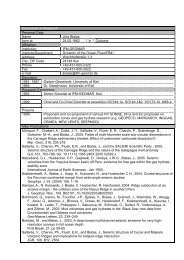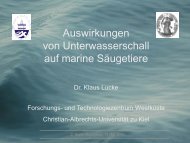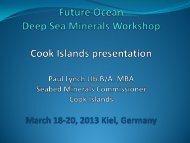Untitled - The Future Ocean
Untitled - The Future Ocean
Untitled - The Future Ocean
- No tags were found...
Create successful ePaper yourself
Turn your PDF publications into a flip-book with our unique Google optimized e-Paper software.
Erwärmung der Ozeane kann zur Freisetzung von Methan aus den Ozeanen führen. Die Ozeanespielen deshalb eine wichtige Rolle in dem Zusammenspiel von Klimawandel und Klimapolitik mitwirtschaftlichen Aktivitäten und einer nachhaltigen Entwicklung, werden aber in der ökonomischenAnalyse des Kohlenstoffmanagements bislang weitgehend ignoriert.Die Ziele der Forschergruppe bestehen darin, die Erkenntnisse der anderen Gruppen zu nutzenund die wirtschaftlichen Aspekte der komplexen Rolle der Ozeane einer integrativen Analysezugänglich zu machen. Zum einen werden die Forschungsschwerpunkte in der Bewertung vonökonomischen Kosten, Nutzen und Risiken von Klimaauswirkungen und Vermeidungs- undAnpassungsmaßnahmen liegen. Zum anderen werden sie sich aus globaler Perspektive auf dieRolle der Ozeane in einem integrierten Kohlenstoffmanagement und auf die Auswirkungen desKlimawandels auf die wirtschaftliche Nutzung der Ozeane konzentrieren.2. State-of-the-artA long history of economic analyses exists which are concerned with the commercial use of naturalresources in the oceans. Optimal fishing strategies as well as the inefficiencies of institutionalarrangements for managing fish stocks have been given attention in numerous theoretical andempirical studies (Arnason 1991, Imeson 2004). <strong>The</strong> use of mineral resources and the ocean’s roleas a transport medium have been analyzed with special reference to legal aspects (Culiane 2004).Other major human impacts on the oceans which have been analyzed from an economicperspective are waste disposal in oceans and spills, the destruction of coastal ecosystems andland-based contamination (Constanza et al. 1999). Other new research activities consider theeconomics of carbon sequestration in oceans, including some first commercial experiments (IPCC2005). On the other hand, climate mitigation policies have been analyzed largely without referenceto the role of the oceans (IPCC 2001), although some analysis of the role of carbon sequestrationin oceans in a global carbon management has been initiated (for a summary of the literature cf.IPCC 2005). Thus far, a comprehensive analysis of carbon management options which include theoceans is lacking in terms of medium-term sequestration options. In addition, an evaluation of theexternalities of sequestration activities as well as the long-term challenges of a changing role of theoceans in the global carbon cycle still need to be investigated.3. Previous and on-going work of the proponentsKlepper, Peterson and Requate have been involved in numerous - often interdisciplinary - projectsand studies which are concerned with the economic modeling and analysis of climate mitigationstrategies, with the impacts of climate change as well as with the effects and efficiency of climatepolicy instruments on national, European and international levels. <strong>The</strong> research of Klepper andPeterson focuses especially on the analysis of climate policies using the numerical simulationmodel DART developed at the Kiel Institute (e.g. Klepper and Peterson 2006). Currently, both areinvolved in an EU network which develops and analyzes strategies for the transition to sustainabledevelopment paths, with particular focus on model improvements, as well as in a project on thesocioeconomic cost of climate change-induced health impacts. Requate has investigated the short-58


